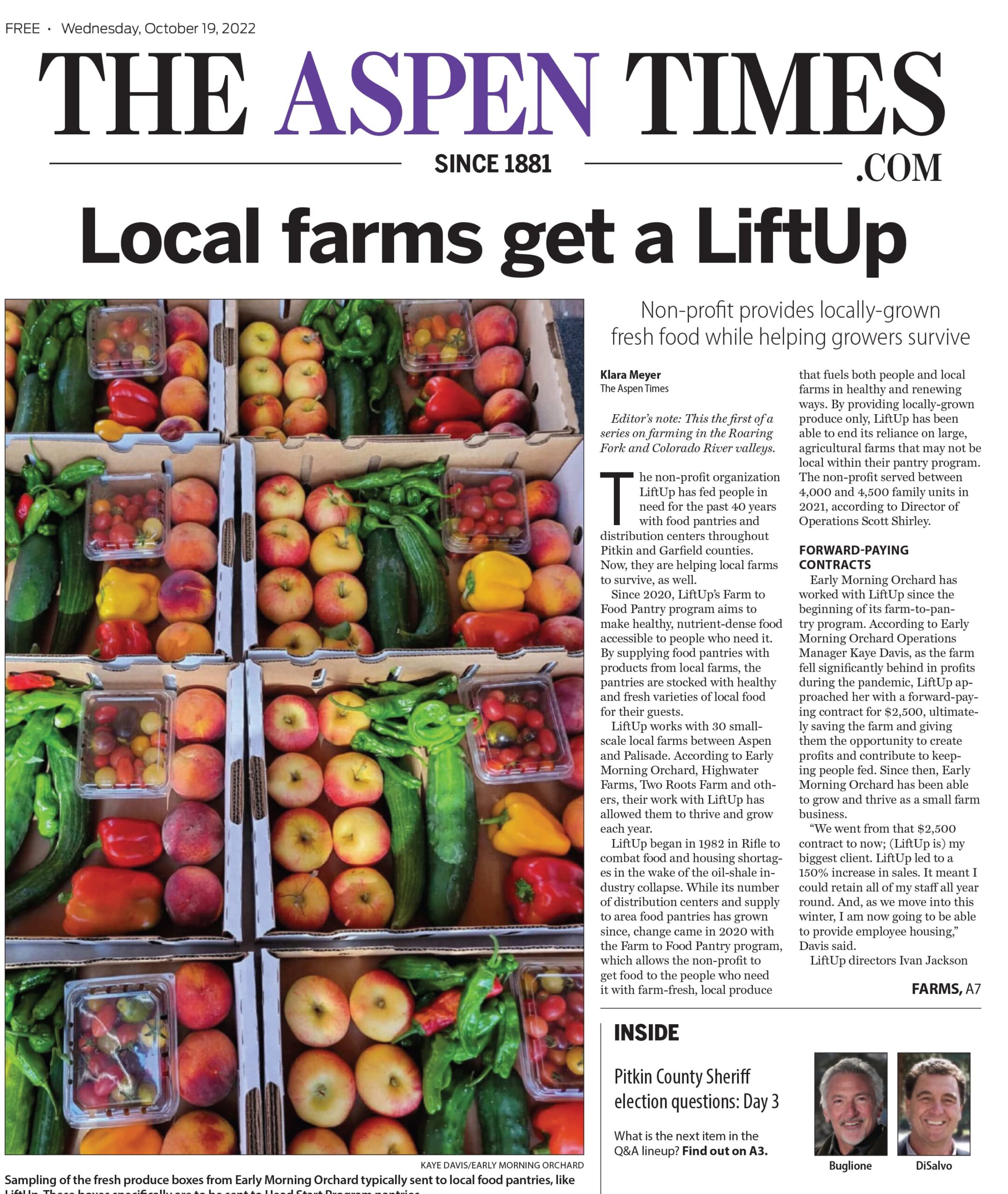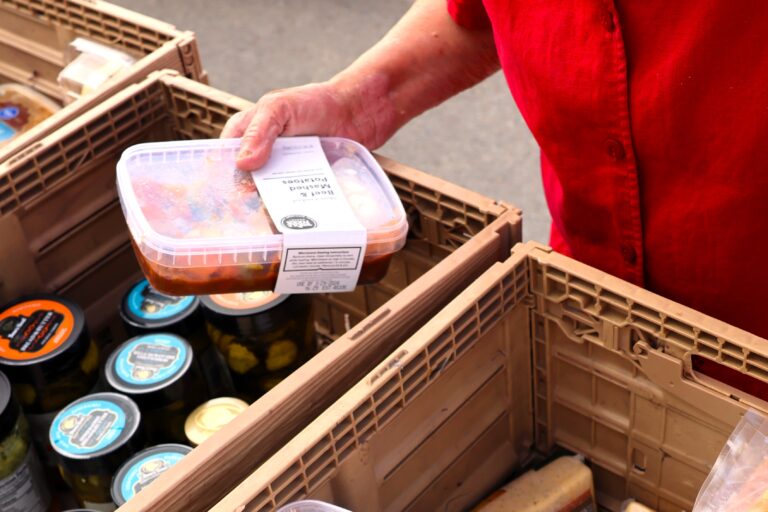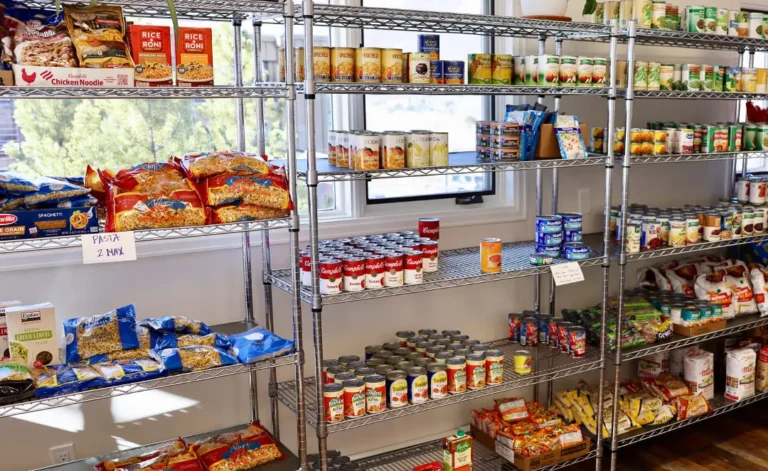The non-profit organization LIFT-UP has fed people in need for the past 40 years with food pantries and distribution centers throughout Pitkin and Garfield counties. Now, they are helping local farms to survive, as well.
Since 2020, LIFT-UP’s Farm to Food Pantry program aims to make healthy, nutrient-dense food accessible to people who need it. By supplying food pantries with products from local farms, the pantries are stocked with healthy and fresh varieties of local food for their guests.
LIFT-UP works with 30 small-scale local farms between Aspen and Palisade. According to Early Morning Orchard, Highwater Farms, Two Roots Farm and others, their work with LIFT-UP has allowed them to thrive and grow each year.
LIFT-UP began in 1982 in Rifle to combat food and housing shortages in the wake of the oil-shale industry collapse. While its number of distribution centers and supply to area food pantries has grown since, change came in 2020 with the Farm to Food Pantry program, which allows the non-profit to get food to the people who need it with farm-fresh, local produce that fuels both people and local farms in healthy and renewing ways. By providing locally-grown produce only, LIFT-UP has been able to end its reliance on large, agricultural farms that may not be local within their pantry program. The non-profit served between 4,000 and 4,500 family units in 2021, according to Director of Operations Scott Shirley.
Forward-Paying Contracts
Early Morning Orchard has worked with LIFT-UP since the beginning of its farm-to-pantry program. According to Early Morning Orchard Operations Manager Kaye Davis, as the farm fell significantly behind in profits during the pandemic, LIFT-UP approached her with a forward-paying contract for $2,500, ultimately saving the farm and giving them the opportunity to create profits and contribute to keeping people fed. Since then, Early Morning Orchard has been able to grow and thrive as a small farm business.
“We went from that $2,500 contract to now; (LIFT-UP is) my biggest client. LIFT-UP led to a 150% increase in sales. It meant I could retain all of my staff all year round. And, as we move into this winter, I am now going to be able to provide employee housing,” Davis said.
LIFT-UP directors Ivan Jackson and Scott Shirley have brought Davis in as their farmer representative to work and negotiate contracts with other local farmers working with LIFT-UP.
“Since (the $2,500 contract with Davis),” Shirley said, “we have written about $133,000 in forward contracts in 2022. And, that’s a huge change in two years, to see that change happen and go from two or three farms to over 30. We have worked with probably over 50 farmers in the last three years.”
In 2022, LIFT-UP entered into these contracts with small-scale farmers between Palisade and Aspen. These contracts ask that farmers supply the non-profit with a certain quantity of product by the end of the year in exchange for payment at wholesale prices it will forward pay.
According to Davis, farms will fill out a survey based on the provided list of requested products from LIFT-UP to say what items and how much they are capable of providing within the year. The farm will state their own wholesale pricing for each product, as well as how much they plan to provide in pounds.
This means that farmers have the money they need to start their season before it has even begun, allowing them to pay employees year-round, buy the seed and infrastructure they need to grow in the next year as well as have more bountiful harvests they can give to the food pantries.
“Based on those numbers, forward contracts are awarded, and the farmers will let me know what dollar amount they can comfortably commit to providing LIFT-UP. Contracts can range from $3,000 to $15,000,” Davis said.
Lifting Up Local Farmers
LIFT-UP began the farm-to-food pantry program to respond to the increase in need in 2020, which rose 600% during the COVID-19 pandemic. As restaurants and hotels pulled out of long-term deals with many local farmers, and markets began to close down, farms found themselves in trouble. As such, after conversations with the Farm Association and LIFT-UP directors, farm-to-pantry made its start.
According to LIFT-UP’s Jackson and Shirley, the combined push for fresher and healthier food variety in pantries, as well as the many available producing farms, created a perfect opportunity to fuel this program with food sourced entirely locally.
“The food that you imagine you get at a food pantry is not necessarily the most exciting food you can think of. It would be a can of soup or pasta, which are great staples, but it’s much better to have fresh, healthy, nutritious foods the farmers are growing,” Jackson said.
“In an average food pantry, the majority of the foods you are going to see on the shelves are all shelf-stable, full of fat, sugar, salt. It’s addictive. It’s not designed to lift people up. It’s designed to keep them where they are. It’s essentially keeping people in the cycle of poverty for profit,” Davis said.
Throughout 2022, LIFT-UP has continued to respond to changing needs. With the help of these 30 local farms, they are estimating they will feed as many as 70,000 people by the end of the year, according to Shirley.
According to Davis, the importance of LIFT-UP’s farm-to-pantry is not only the ability to get healthier varieties of food into the pantries, but also they are helping farms remain profitable and able to grow within these contracts.
Davis highlighted the way each individual farm has been able to thrive within their own individual missions rather than competing with each other in a market environment.
“Farmers supporting farmers is a wonderful thing that has come out of this program — that we all realize we are working toward the same goal. We are not competing with each other. We all bring our own individual things that we bring to the table. Ours is food access. Other farms are breeding new seeds or training young farmers,” she said.
Lifting Up Farms: Two Roots
Creating a generation of new, passionate young farmers, Two Roots Farm owner Harper Kaufman is moving toward ending the cycles of food insecurity in the Roaring Fork Valley.
The farm is a seven-years-running regenerative farm in Emma open space in Basalt. Regenerative agriculture is a way of farming based in partnering with the ecosystem of the land as a whole. This means prioritizing soil health and diversity down to the microbe, creating healthier and more sustainable land for growing food.
Kaufman said her mission with Two Roots is to create a generation of experienced and passionate farmers who are well-trained in regenerative agriculture.
“I do believe small farms can make a huge impact,” she said, “but we need a lot of us doing it. So, part of Two Roots Farm’s goal is to train and educate farmers to continue in agriculture. I am proud that every past employee, except maybe one, is still working in agriculture. People do come here and fall in love with it, but we definitely strive to find folks who are passionate about making a life in agriculture and learning how they can make their impact.”
Since starting with LIFT-UP, Two Roots Farm has been able to expand to four greenhouses, nine employees and over 250 members of their Community Supported Agriculture program (CSA). This farm is not only supplying healthy produce, but they have also been able to continue growing their harvests, bringing greater bounties each year.
Kaufman’s farm grows a variety of herbs, vegetables and flowers. With the expansion of her greenhouses, she will be able to produce more during the early winter months. She grows right out of the soil in the greenhouses but is only able to heat two of the four.
Though these are heated with propane during the coldest months, it can be a challenge to run heating all winter because of its cost. In the winter, Two Roots will continue to grow tomatoes, green beans, peppers, cucumbers and other early-spring crops in the greenhouses.
Her focus on training new farmers has brought success to other areas of the farm-to-table community. Before taking over the Aspen Art Museum rooftop cafe, The Farmer & Chef duo Tiffany Pineda-Scarlett and Joey Scarlett spent two years working at Two Roots with Kaufman.
Kaufman credited her expansion in the past three years to her partnership with Lift Up, which has enabled her to keep five employees on staff full time and four part-time workers.
Finding employees for small farms in this valley is a great challenge. She talked about how difficult it is to find housing near the farm for her employees and is not currently able to provide housing. Both she and Davis expressed how important it is to be on and available to the land during the season, and Davis being able to provide employee housing is a “really big deal,” she said.
However, on these regenerative small-scale farms, like Two Roots and Early Morning Orchard, it can also be difficult to find experienced staff regardless of other accessibility and housing conflicts. Davis and Kaufman said how much more important it is to find people who are open, passionate and hardworking than experienced or previously trained.
“If you are coming to the farm with the idea that you are here to feed people,” Davis said, “then everything else can be taught. But, if you don’t have that core value that everyone deserves access to really good food, this isn’t the place for you.”
Early Morning Orchard has found the majority of their current staff from previous members, and over 90% are under the age of 24. The farm also works with Colorado Mesa University to hire seasonal interns for their farm and culinary program, according to Davis.
“The trend that I am seeing with my young staff,” she said, “is that they are attracted to the work of farming because of the ability to have an impact at the local level. They work really hard, and they’re willing to learn. I prefer that to someone who is going to come here with preconceived ideas of how things are going to work.”
LIFT-UP distribution centers are located in Aspen, Carbondale, Glenwood Springs, New Castle, Rifle and Parachute.









